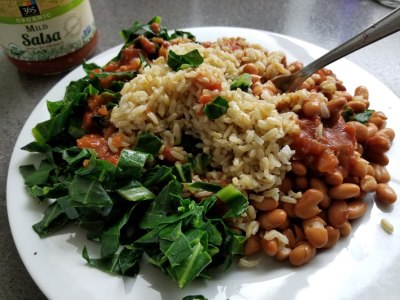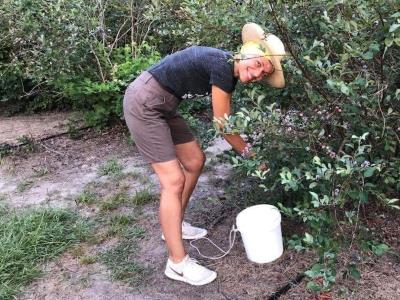My journey to health began in the wee hours of the morning in early 2014 when I awoke to an unsettling, fluttering sensation in my chest. Lying in bed, I put my fingers to the side of my neck to check a pulse. I glanced at the bedside clock and timed the beats over one minute. Two hundred and twenty beats. More than double a normal heart rate. I tried to rise from the bed to make my way to the living room, but was too dizzy to walk. I sat back on the bed and lay awake over the next two hours, counting my heart rate as it slowly returned to normal.
I knew something was off. In fact, I'd known it for several months. I'd been experiencing heart palpitations, usually when I was at the hospital where I worked as a Registered Nurse. I chalked the irregular heartbeats and periods of intense flushing to job-related stress and the beginnings of menopause. After all, I was 50 and it was time. But the symptoms rapidly progressed. The occasional skipped beats increased in frequency. I would soak my clothes with sweat. I rapidly dropped 15 lbs. despite an insatiable appetite. I was uncharacteristically irritable and wasn't sleeping well.
My nursing background and our family history of thyroid issues told me to start there. One of the hospital's cardiologists who I liked and respected was on the unit one morning rounding on his patients. I asked if I could make an appointment. "I need a TSH level," I told him. TSH stands for thyroid stimulating hormone. The level would tell me if my thyroid was functioning normally, or if, as I suspected, something had gone haywire. The test came back wildly abnormal, indicating I'd developed hyperthyroidism, one of hundreds of autoimmune diseases. An endocrinologist, who ordered more diagnostic tests, confirmed the diagnosis. His recommendation? Radioactive iodine to kill my thyroid and a lifetime supply of synthetic thyroid medication.
My nursing studies and clinical practice taught me the importance of the small butterfly shaped gland at the base of the throat and its important regulatory effect on nearly every cell in the body. I instinctively felt there had to be another answer and began combing online research databases. There I uncovered articles indicating a plant-based diet and acupuncture were effective treatments. Ironically a nursing colleague and I had been talking some months earlier about her dramatic health experience after switching to a plant-based diet. We talked as she munched raw green beans. At the time it all sounded just a bit far-fetched. But now I figured I had nothing to lose.
I immediately eliminated dairy, eggs, meat and cheese from my diet, replacing them with more vegetables, fruits and whole grain cereals. I started weekly acupuncture appointments and a course of Chinese herbs targeted at my condition. The effect was immediate. Within two weeks, the heart palpitations didn't just decrease. They stopped. I began to sleep better. My weight stabilized. I watched the documentary "Forks Over Knives," which confirmed the incredible disease reversing power of plant foods. I read everything I could get my hands on regarding the subject.
As I read and watched, the thought ringing in my head was, "Why didn't anyone tell me this before?" How did I get through four years of school designed to turn me into a health care practitioner and hadn't heard this? Determined to get professional support from a like-minded physician, I Googled "Plant Based Doctors." I was stunned to realize there was a plant-based doctor in the office complex at the front of my neighborhood.
Finding a health partner like Dr. Linda Carney was a true gift. She took the time to teach me the power of a fully unprocessed, plant-based, no-oil diet. She monitored my labs as everything improved and my thyroid function normalized.
Looking back, I now understand that if my journey to health began in 2014, my journey to sickness began three decades earlier when I left home and upped my junk food diet during my college years. I indulged a raging sweet tooth with whole cheesecakes, ice cream, brownies and boxes of my favorite cookies.
Then when I married, I became determined to master my husband's favorite family recipes. Unfortunately he was born and raised in Kentucky, smack dab in the center of the nation's heart disease, diabetes and stroke belt. As I created and served plates of meat, gravy, cheese-laden pastas and lavish baked goods, my weight, never particularly low to begin with, began to climb from the 150s into the 170s.
When I became pregnant I kept my weight gain to 20 pounds, but that weight didn't come off after I delivered, despite breastfeeding and taking walks every afternoon. By the time we moved to Austin, TX in July of 2002, my weight climbed into the low 200s and I was squeezing myself into size 18 shorts.
Fortunately the lifestyle in Austin is much more active and the local grocery store featured a bounty of fresh produce. Those factors combined to help me lower my weight over the next decade to 160, finally getting back down to a normal BMI. But I was still eating cheese, eggs, dairy and meat, albeit in lower quantities as fruits and vegetables played a bigger role on my plate. I looked healthier, but those animal protein foods created a smoldering, abnormal immune system response that eventually caught fire and ravaged my thyroid.
There were other issues in addition to my thyroid disease. Through the years, I suffered from uterine fibroids and the accompanying menstrual irregularities, as well as fibrotic and tender breasts. I also had painful flares of a condition called iritis, which is another autoimmune condition that inflames the iris of the eye. I never connected these to the animal foods I was consuming, and no health care provider I saw connected those dots for me either. Instead, they prescribed steroid medications and advised me to have a hysterectomy.
Fortunately my new plant-based doctor drew a straight line for me from sickness to health. And that line went straight through platefuls of food that featured delicious potatoes, whole grains, beans, vegetables and fruit. Under her guidance, I slimmed down effortlessly to 130 pounds and a body fat percentage that puts me in a category classified as ideal for optimal health. My cholesterol has dropped from 207 in March of 2012, to 146 in January of this year. No statin drugs for this gal and no hysterectomy either. I still have all my parts.
I have more energy than I ever dreamed possible and exercise not for weight control, but because it's such a pleasure to move about in a body that's light, pain-free and has a marvelous capacity for recovery.
I became so excited about this new way of living that Dr. Carney and I partnered with others to form ATX Alive, a plant-based support group for the Austin area that has grown dramatically in its 2 ½ years existence. This group of like-minded people has become my new tribe and I've developed some wonderful, lasting friendships with several members.
I like to tell people now that instead of falling apart as I head into my sixth decade, I'm actually falling together. Still working as a hospital-based RN, I feel a responsibility to tell my patients about the effect dietary change could have on their chronic disease conditions. Like many Americans, they suffer from high blood pressure, diabetes, cardiovascular disease, diverticulitis and other gut problems, as well as autoimmune diseases and joint degeneration causing disabling pain.
For those who are receptive, I hand them a list of my favorite resources – books and videos to get them started on the path to good health. I enjoy coaching others to good health and seeing the accompanying physical and emotional changes.
I don't want them to ever say, after they've been under the care of this nurse: "Why didn't anyone ever tell me?"


